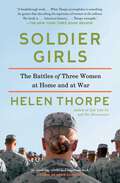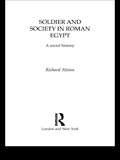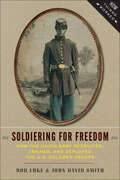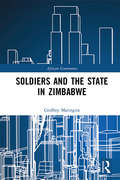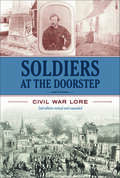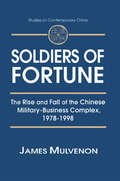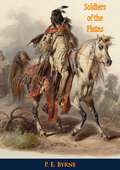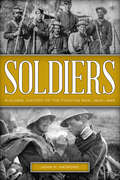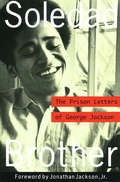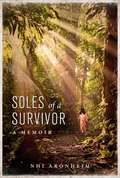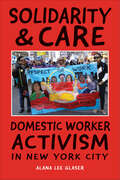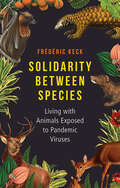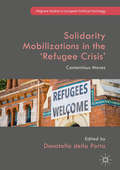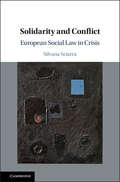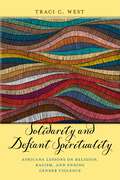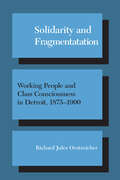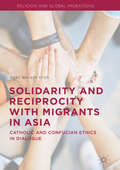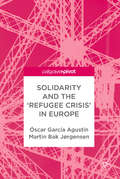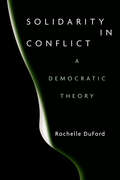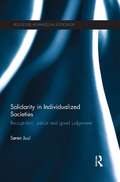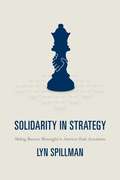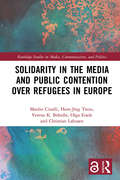- Table View
- List View
Soldier Girls: The Battles of Three Women at Home and at War
by Helen ThorpeFrom an award-winning, "meticulously observant" (The New Yorker), and "masterful" (Booklist) writer comes a groundbreaking account of three women deployed to Afghanistan and Iraq, and how their military service affected their friendship, their personal lives, and their families.America has been continuously at war since the fall of 2001. This has been a matter of bitter political debate, of course, but what is uncontestable is that a sizeable percentage of American soldiers sent overseas in this era have been women. The experience in the American military is, it's safe to say, quite different from that of men. Surrounded and far outnumbered by men, imbedded in a male culture, looked upon as both alien and desirable, women have experiences of special interest. In Soldier Girls, Helen Thorpe follows the lives of three women over twelve years on their paths to the military, overseas to combat, and back home...and then overseas again for two of them. These women, who are quite different in every way, become friends, and we watch their interaction and also what happens when they are separated. We see their families, their lovers, their spouses, their children. We see them work extremely hard, deal with the attentions of men on base and in war zones, and struggle to stay connected to their families back home. We see some of them drink too much, have illicit affairs, and react to the deaths of fellow soldiers. And we see what happens to one of them when the truck she is driving hits an explosive in the road, blowing it up. She survives, but her life may never be the same again. Deeply reported, beautifully written, and powerfully moving, Soldier Girls is truly groundbreaking.
Soldier and Society in Roman Egypt: A Social History
by Richard AlstonThe province of Egypt provides unique archaeological and documentary evidence for the study of the Roman army. In this fascinating social history Richard Alston examines the economic, cultural, social and legal aspects of a military career, illuminating the life and role of the individual soldier in the army.Soldier and Society in Roman Eygpt provides a complete reassessment of the impact of the Roman army on local societies, and convincingly challenges the orthodox picture. The soldiers are seen not as an isolated elite living in fear of the local populations, but as relatively well-integrated into local communities. The unsuspected scale of the army's involvement in these communities offers a new insight into both Roman rule in Egypt and Roman imperialism more generally.
Soldiering Under Occupation
by Erella GrassianiOften, violent behavior or harassment from a soldier is dismissed by the military as unacceptable acts by individuals termed, "rotten apples." In this study, the author argues that this dismissal is unsatisfactory and that there is an urgent need to look at the (mis)behavior of soldiers from a structural point of view. When soldiers serve as an occupational force, they find themselves in a particular situation influenced by structural circumstances that heavily influence their behavior and moral decision-making. This study focuses on young Israeli men and their experiences as combat soldiers in the Israeli Defense Forces (IDF), particularly those who served in the "Occupied Palestinian Territories" (OPT) during the "Al Aqsa Intifada," which broke out in 2000. In describing the soldiers' circumstances, especially focusing on space, the study shows how processes of numbing on different levels influence the (moral) behavior of these soldiers.
Soldiering for Freedom: How the Union Army Recruited, Trained, and Deployed the U.S. Colored Troops (How Things Worked)
by John David Smith Bob LukeThe story of an enormous step forward in both the struggle for black freedom and the defeat of the Confederacy: turning former enslaved men into Union soldiers.After President Lincoln issued the final Emancipation Proclamation of January 1, 1863, Confederate slaves who could reach Union lines often made that perilous journey. A great many of the young and middle-aged among them, along with other black men in the free and border slave states, joined the Union army. These U.S. Colored Troops (USCT), as the War Department designated most black units, materially helped to win the Civil War—performing a variety of duties, fighting in some significant engagements, and proving to the Confederates that Northern manpower had practically no limits.Soldiering for Freedom explains how Lincoln’s administration came to recognize the advantages of arming free blacks and former slaves and how doing so changed the purpose of the war. Bob Luke and John David Smith narrate and analyze how former slaves and free blacks found their way to recruiting centers and made the decision to muster in. As Union military forces recruited, trained, and equipped ex-slave and free black soldiers in the last two years of the Civil War, white civilian and military authorities often regarded the African American soldiers with contempt. They relegated the men of the USCT to second-class treatment compared to white volunteers. The authors show how the white commanders deployed the black troops, and how the courage of the African American soldiers gave hope for their full citizenship after the war.Including twelve evocative historical engravings and photographs, this engaging and meticulously researched book provides a fresh perspective on a fascinating topic. Appropriate for history students, scholars of African American history, or military history buffs, this compelling and informative account will provide answers to many intriguing questions about the U.S. Colored Troops, Union military strategy, and race relations during and after the tumultuous Civil War.
Soldiers and Their Horses: Sense, Sentimentality and the Soldier-Horse Relationship in The Great War (Routledge Studies in Cultural History #83)
by Jane FlynnThe soldier-horse relationship was nurtured by The British Army because it made the soldier and his horse into an effective fighting unit. Soldiers and their Horses explores a complex relationship forged between horses and humans in extreme conditions. As both a social history of Britain in the early twentieth century and a history of the British Army, Soldiers and their Horses reconciles the hard pragmatism of war with the imaginative and emotional. By carefully overlapping the civilian and the military, by juxtaposing "sense" and "sentimentality," and by considering institutional policy alongside individual experience, the soldier and his horse are re-instated as co-participators in The Great War. Soldiers and their Horses provides a valuable contribution to current thinking about the role of horses in history.
Soldiers and the State in Zimbabwe (African Governance)
by Godfrey MaringiraThis book explores the barrack experiences of soldiers in post-independence Zimbabwe, examining the concept of military professionalism within a state in political crisis. Drawing upon interviews with former soldiers of the Zimbabwe National Army, Soldiers and the State in Zimbabwe casts a light on the oppression of soldiers by commanders who sought to repress and control the political thinking of their men. By contextualising the political, economic and material conditions in which Zimbabwean soldiers existed, Godfrey Maringira reveals the everyday victimisation and violence of the barracks. Exploring such events as the imposition of the Defence Act, the desertion of soldiers, and the 2017 military coup in Zimbabwe, the book presents and discusses the politicised nature of the military in post-independence Zimbabwe, and the political consequences of service in a state in deep political crisis. Soldiers and the State in Zimbabwe will be of interest to scholars and students of African Politics, military and security studies, and African studies.
Soldiers at the Doorstep: Civil War Lore
by Larry S. Chowning24 tales handed down by word-of-mouth detail life behind enemy lines during the Civil WarExpanded 2nd edition includes four more vignettes and photos and updates to previous entriesQuick-thinking residents used the fear of smallpox to spare a tavern from Union torches
Soldiers of Fortune: The Rise and Fall of the Chinese Military-Business Complex, 1978-1998
by James C. MulvenonIn 1978, faced with the pressure to modernize and a declining budget, the Chinese People's Liberation Army (PLA) reluctantly agreed to join China's economic reform drive, expanding its internal economy to market-oriented civilian production. This work examines PLA's role in the economy up to 1998.
Soldiers of the Plains
by P. E. ByrneThe Indian was the great soldier of the plains and, in many respects, the greatest fighter the world has ever known. But, unlike the white man, the Indian had no press agency through which to broadcast his story to the world.And so it comes about that for the most part such knowledge as we have respecting Indian war ventures, for example, comes not from the Indian but from sources having no interest in presenting the Indian point of view—from official government reports and from stories of men actively engaged with those opposed to the red man. The result: almost all reports of Indian warfare were unfavorable to the Indian,—his reasons for war misrepresented; his victories discounted; his acts of heroism, if mentioned at all, carefully flattened out to the level of the commonplace.In this account an attempt is made to say a word for the red man; to present his side fairly and with sympathetic understanding; to discuss frankly his experience in treaty negotiation; to draw attention to some of his remarkable military exploits; and to touch upon his high qualities as a factor in civilized life. To that extent it supplies a much needed contribution to the frontier history of our time, for we owe to the Indian a fair statement of his case and a just estimate of his qualities as a warrior and a man.The scope of the discussion is limited. It is concerned mainly with events leading up to and including the battle of the Little Big Horn, March 25-26, 1876. Incidentally something is contributed to a clearer understanding of General Custer’s part in that campaign.
Soldiers: A Global History of the Fighting Man, 1800–1945
by John A HaymondA global study of how soldiers lived, worked, and fought, and how many died, spanning from the Napoleonic War to World War II. No matter the war, no matter the army, no matter the nationality, common threads run through the experiences of men at war. Soldiers highlights these shared experiences across 150 years of warfare, from the Napoleonic Wars through World War II and everything in between, such as the Mexican and Crimean Wars, the American Civil War, the U.S. Indian Wars and Britain&’s imperial bush wars, the Boxer Rebellion, the Boer War, the First World War, and more. Haymond explores the experiences that connect soldiers across time and space and draws heavily from firsthand accounts to craft a narrative with flesh-and-blood immediacy. Soldiers is entertaining and informative: history at its best. Praise for Soldiers&“What makes Soldiers an interesting read is Haymond&’s writing style and technique of comparing the common experiences of fighting men regardless of uniform and time served during the period.... Highly recommended for both scholars and students alike. It is a must for readers interested in the experience and psychology of being a warrior during this period.&”—Military Review: The Professional Journal of the United States Army
Soledad Brother: The Prison Letters of George Jackson
by George Jackson Jean Genet Jonathan Jackson Jr.A collection of Jackson's letters from prison, Soledad Brother is an outspoken condemnation of the racism of white America and a powerful appraisal of the prison system that failed to break his spirit but eventually took his life. Jackson's letters make palpable the intense feelings of anger and rebellion that filled black men in America's prisons in the 1960s. But even removed from the social and political firestorms of the 1960s, Jackson's story still resonates for its portrait of a man taking a stand even while locked down.
Soles of a Survivor: A Memoir
by Nhi AronheimThe Unbelievable True Story of a Vietnamese Refugee Who Not Only Made the United States Her Home, But Learned the True Value of Hope, Love, and Religion Along the Way The soles of Nhi Aronheim's feet still bear the scars of her escape from Vietnam—trudging through the jungles of Cambodia as a twelve-year-old with a group of strangers seeking the land of opportunity: America. Her quest for survival through the Cambodian jungle eventually led her to a boat that took her to Thailand and an orphanage where Nhi lived for two years until she qualified for refugee status in the United States. Years later, she returned to Vietnam with a film producer to reunite with the family she never thought she&’d see again. A second trip to Vietnam brought her two mothers, birth and adopted, face to face. Yet Soles of a Survivor isn&’t just another inspirational survival story. It&’s about the lessons Nhi learned about humanity, diversity, and unconditional love since arriving in the United States. She now has a deeper appreciation for the parallels between the Jewish and Vietnamese cultures, and others. After she met her Jewish beau, they got married. She eventually converted to Judaism, though the process was challenging for an Asian woman adopted into a Christian household. Her story shows it matters less what religion we&’re part of, as long as we radiate goodness to those we meet. Now she relishes being a Vietnamese Jew. Having come full circle from prosperity to poverty and back, Nhi hopes to encourage others to believe that in spite of overwhelming odds, all things are possible if one has an intense desire, focused energy, and the audacity to grasp presented opportunities.
Solidarity & Care: Domestic Worker Activism In New York City
by Alana Lee GlaserThe members of the Domestic Workers United (DWU) organization—immigrant women of color employed as nannies, caregivers, and housekeepers in New York City—formed to fight for dignity and respect and to “bring meaningful change” to their work. Alana Lee Glaser examines the process of how these domestic workers organized against precarity, isolation, and exploitation to help pass the 2010 New York State Domestic Worker Bill of Rights, the first labor law in the United States protecting in-home workers. Solidarity & Care examines the political mobilization of diverse care workers who joined together and supported one another through education, protests, lobbying, and storytelling. Domestic work activists used narrative and emotional appeals to build a coalition of religious communities, employers of domestic workers, labor union members, and politicians to first pass and then to enforce the new law. Through oral history interviews, as well as ethnographic observation during DWU meetings and protest actions, Glaser chronicles how these women fought (and continue to fight) to improve working conditions. She also illustrates how they endure racism, punitive immigration laws, on-the-job indignities, and unemployment that can result in eviction and food insecurity. The lessons from Solidarity & Care along with the DWU’s precedent-setting legislative success have applications to workers across industries. All royalties will go directly to the Domestic Workers United
Solidarity Between Species: Living with Animals Exposed to Pandemic Viruses
by Frederic KeckThis book examines how the Covid-19 pandemic can be described as a biopolitical crisis, taking into account a fact often overlooked by commentators: Covid-19 is a zoonosis, a disease transmissible between animal species. The Sars-Cov2 virus causing this respiratory disease circulated in bats before passing to humans under as-yet mysterious conditions, and it was transmitted from humans to other species, notably mink and deer. Building on Michel Foucault’s revival of the term “biopolitics” and related notions (disciplinary power, pastoral power, cynegetic power), this book traces a set of public health measures taken over the last two centuries to control epidemics. It underlines how the need to conserve virus strains in order to identify and anticipate their mutations has given rise to cryopolitics, a set of techniques aimed at suspending the living in order to defer death. The book then questions the emancipatory scope of this cryopolitics by examining interspecies solidarity built by the warning signals sent by animals to humans about coming threats, be they pandemics, natural disasters, or climate change. By blurring the boundaries between the wild and the domestic resulting from the process of domestication, the politics of zoonoses relies on sentinels who preserve the memory of signs from the past to prepare living beings for future threats by involving them in a common ideal.
Solidarity Cities: Confronting Racial Capitalism, Mapping Transformation (Diverse Economies and Livable Worlds)
by Stephen Healy Marianna Pavlovskaya Maliha Safri Craig BorowiakMapping the transformative effects of America&’s urban solidarity economies Solidarity economies, characterized by diverse practices of cooperation and mutual support, have long played pivotal but largely invisible roles in fostering shared survival and envisioning alternatives to racial capitalism globally and in the United States. This book maps the thriving existence of these cooperative networks in three differently sized American cities, highlighting their commitment to cooperation, democracy, and inclusion and demonstrating the desire—and the pressing need—to establish alternative foundations for social and economic justice. Collectively authored by four social scientists, Solidarity Cities analyzes the deeply entrenched racial and economic divides from which cooperative networks emerge as they work to provide unmet basic needs, including food security, affordable housing, access to fair credit, and employment opportunities. Examining entities such as community gardens, credit unions, cooperatives, and other forms of economic solidarity, the authors highlight how relatively small yet vital interventions into public life can expand into broader movements that help bolster the overall well-being of their surrounding communities. Bringing together insights from geography, political economy, and political science with mapping and spatial analysis methodologies, surveys, and in-depth interviews, Solidarity Cities illuminates the extensive footprints of solidarity economies and the roles they play in communities. The authors show how these initiatives act as bulwarks against gentrification, exploitation, and economic exclusion, helping readers see them as part of the past, present, and future of more livable and just cities. Retail e-book files for this title are screen-reader friendly with images accompanied by short alt text and/or extended descriptions.
Solidarity Mobilizations in the ‘Refugee Crisis’: Contentious Moves (Palgrave Studies In European Political Sociology Series)
by Donatella Della PortaThis edited collection introduces conceptual innovations that critically engage with understanding refugee movements as part of the broader category of ‘poor people’s movements’. The empirical focus of the work lies on the protest events related to the so-called ‘long summer of migration’ of 2015. It traces the route followed by the migrants from the places of first arrival to the places of passage and on to the places of destination. Through qualitative and quantitative data, the authors map, within a cross-national comparative perspective, the wide set of actions and initiatives that are being created in solidarity with refugees who have made their journey seeking asylum to the European Union, either travelling across the Mediterranean Sea or through South Eastern Europe. It explores these cases from the perspective of social movement studies alongside critical studies on migration and citizenship.
Solidarity and Conflict: European Social Law In Crisis
by Silvana SciarraThe ongoing austerity crisis is being felt in all sectors of EU law, but has had a particularly severe impact on labour law. <P><P>Silvana Sciarra, a leading judge and scholar of EU employment law, considers how solidarity regimes have been shaken by the crisis. She brings together existing European policies in social and employment law, to enhance synergies and developments in a post-crisis discourse. She looks at reactions of national constitutional courts to austerity measures and of international organizations in re-establishing respect of fundamental workers' rights. <P>Criticizing soft law approaches in employment policies, she favours recourse to binding measures connected with selective financial incentives through European funds. She highlights developments in European sector social dialogue and new horizons of transnational collective bargaining in large multinationals. Taking a positive, practical approach, Sciarra shows how social policies can enhance solidarity and social cohesion, through European financial support. <P>Provides a critical and constructive point of view on European social law developments.<P> Combines information on legal sources with proposals for better policy making.<P> Discusses highly topical issues around austerity and workers' rights.
Solidarity and Defiant Spirituality: Africana Lessons on Religion, Racism, and Ending Gender Violence (Religion and Social Transformation #4)
by Traci C. WestHow activists in Ghana, South Africa, and Brazil provide inspiration and strategies for combating the gender violence epidemic in the United States How can the U.S. learn from the perspectives of anti-gender violence activists in South America and Africa as we seek to end intimate violence in this country? The U.S. has consistently positioned itself as a moral exemplar, seeking to export its philosophy and values to other societies. Yet in this book, Traci C. West argues that the U.S. has much to learn from other countries when it comes to addressing gender-based violence. West traveled to Ghana, South Africa, and Brazil to interview activists involved in the struggle against gender violence. In each of these places, as in the United States, Christianity and anti-black racism have been implicated in violence against women. In Ghana and Brazil, in particular, their Christian colonial and trans-Atlantic slave trade histories directly connect with the socioeconomic development of the Americas and historic incidents of rape of black slave women. With a transnational focus on religion and racism, West brings a new perspective to efforts to systemically combat gender violence. Calling attention to forms of violence in the U.S. and international settings, such as marital rape, sex trafficking of women and girls, domestic violence, and the targeting of lesbians, the book offers an expansive and nuanced view of how to form activist solidarity in tackling this violence. It features bold and inspiring approaches by black women leaders working in each setting to uproot the myriad forms of violence against women and girls. Ultimately, West calls for us to learn from the lessons of Africana activists, drawing on a defiant Africana spirituality as an invaluable resource in the quest to combat the seemingly chronic problem of gender-based violence.
Solidarity and Fragmentation: Working People and Class Consciousness in Detroit, 1875-1900 (Working Class in American History)
by Richard Jules OestreicherHow did the interplay between class and ethnicity play out within the working class during the Gilded Age? Richard Jules Oestreicher illuminates the immigrant communities, radical politics, worker-employer relationships, and the multiple meanings of workers' affiliations in Detroit at the end of the nineteenth century.
Solidarity and Reciprocity with Migrants in Asia: Catholic and Confucian Ethics in Dialogue (Religion and Global Migrations)
by Mary Mee-Yin YuenBased on Catholic and Confucian social ethics, this book develops an ethic of solidarity and reciprocity with the migrants in Asia who are marginalized. Mary Mee-Yin Yuen draws off her own pastoral experiences in the Church, the situation of the wider Christian community, and the personal experiences of migrant women from various Asian countries in Hong Kong, to describe the features and practices of an ethical approach that emphasizes solidarity and reciprocity. Interdisciplinary in nature, this book integrates Catholic social ethics, moral philosophy, Chinese Confucian ethics, social sciences, and cultural studies to investigate the phenomenon of international and intra-national migration in Asia, particularly with regard to women migrants moving from South Asia, Southeast Asia, and Mainland China to Hong Kong.
Solidarity and the 'Refugee Crisis' in Europe
by Óscar García Agustín Martin Bak JørgensenNew forms of solidarity are being shaped as a response to the European “refugee crisis.” The state—in the form of national governments—has not been able to implement any viable or sustainable solution to the crisis, but the solidarity movement has been very visible and active in European countries. This book offers a conceptualization of three types of solidarity: autonomous, civic, and institutional solidarity. This framework is applied to three case studies, illustrating the emergence of different forms of solidarity: the City Plaza Hotel in Athens, the Danish “friendly neighbors,” and Barcelona as refuge city.
Solidarity in Conflict: A Democratic Theory
by Rochelle DuFordDemocracy has become disentangled from our ordinary lives. Mere cooperation or ethical consumption now often stands in for a robust concept of solidarity that structures the entirety of sociality and forms the basis of democratic culture. How did democracy become something that is done only at ballot boxes and what role can solidarity play in reviving it? In Solidarity in Conflict, Rochelle DuFord presents a theory of solidarity fit for developing democratic life and a complementary theory of democracy that emerges from a society typified by solidarity. DuFord argues that solidarity is best understood as a set of relations, one agonistic and one antagonistic: the solidarity groups' internal organization and its interactions with the broader world. Such a picture of solidarity develops through careful consideration of the conflicts endemic to social relations and solidarity organizations. Examining men's rights groups, labor organizing's role in recognitional protections for LGBTQ members of society, and the debate over trans inclusion in feminist praxis, DuFord explores how conflict, in these contexts, becomes the locus of solidarity's democratic functions and thereby critiques democratic theorizing for having become either overly idealized or overly focused on building and maintaining stability. Working in the tradition of the Frankfurt School, DuFord makes a provocative case that the conflict generated by solidarity organizations can address a variety of forms of domination, oppression, and exploitation while building a democratic society.
Solidarity in Individualized Societies: Recognition, Justice and Good Judgement (Routledge Advances in Sociology)
by Søren JuulIn today’s individualized, culturally diverse and globalized society, many sociologists have concluded that the conceptualizations developed by classical sociology are no longer sufficient to promote social cohesion. So what kind of solidarity can achieve this? Engaging with recent thought in social and political theory and philosophy (including Honneth, Forst, Ricoeur, Bauman, Sennett, Taylor, Rawls, MacIntyre and many others), this book develops a renewed concept of solidarity based on the notion of ‘recognition’ with regard to others. With attention to the implications of such an account for justice and judgement – particularly where competing claims for recognition arise – Solidarity in Individualized Societies examines what, in a society based on recognition, a fair distribution of recognition would mean. The book provides a critical analysis of trends in modern culture and in the policy on welfare that seem to constitute obstacles to solidarity and social cohesion. It is a rigorous examination of forms of solidarity that may sustain social cohesion in the contemporary Western world. This book will appeal to scholars and students of sociology, social theory, politics and philosophy.
Solidarity in Strategy: Making Business Meaningful in American Trade Associations
by Lyn SpillmanPopular conceptions hold that capitalism is driven almost entirely by the pursuit of profit and self-interest. Challenging that assumption, this major new study of American business associations shows how market and non-market relations are actually profoundly entwined at the heart of capitalism. In Solidarity in Strategy, Lyn Spillman draws on rich documentary archives and a comprehensive data set of more than four thousand trade associations from diverse and obscure corners of commercial life to reveal a busy and often surprising arena of American economic activity. From the Intelligent Transportation Society to the American Gem Trade Association, Spillman explains how business associations are more collegial than cutthroat, and how they make capitalist action meaningful not only by developing shared ideas about collective interests but also by articulating a disinterested solidarity that transcends those interests. Deeply grounded in both economic and cultural sociology, Solidarity in Strategy provides rich, lively, and often surprising insights into the world of business, and leads us to question some of our most fundamental assumptions about economic life and how cultural context influences economic.
Solidarity in the Media and Public Contention over Refugees in Europe (Routledge Studies in Media, Communication, and Politics)
by Christian Lahusen Hans-Jörg Trenz Manlio Cinalli Verena Brändle Olga EiseleThis book examines the ‘European refugee crisis’, offering an in-depth comparative analysis of how public attitudes towards refugees and humanitarian dispositions are shaped by political news coverage. An international team of authors address the role of the media in contesting solidarity towards refugees from a variety of disciplinary perspectives. Focusing on the public sphere, the book follows the assumption that solidarity is a social value, political concept and legal principle that is discursively constructed in public contentions. The analysis refers systematically and comparatively to eight European countries, namely, Denmark, France, Germany, Greece, Italy, Poland, Switzerland and the United Kingdom. Treatment of data is also original in the way it deals with variations of public spheres by combining a news media claims-making analysis with a social media reception analysis. In particular, the book highlights the prominent role of the mass media in shaping national and transnational solidarity, while exploring the readiness of the mass media to extend thick conceptions of solidarity to non-members. It proposes a research design for the comparative analysis of online news reception and considers the innovative potential of this method in relation to established public opinion research. The book is of particular interest for scholars who are interested in the fields of European solidarity, migration and refugees, contentious politics, while providing an approach that talks to scholars of journalism and political communication studies, as well as digital journalism and online news reception.
